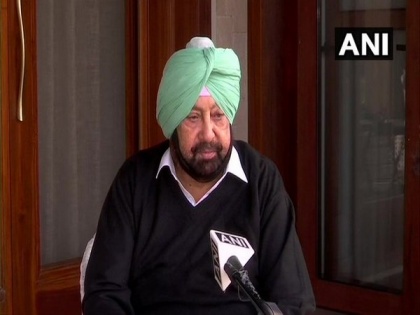Punjab to amend industrial policy to avail incentives through extension of GST formula
By ANI | Published: February 19, 2021 09:57 PM2021-02-19T21:57:35+5:302021-02-19T22:05:02+5:30
To promote post-COVID industrial revival and attract greater investment, the Punjab Cabinet led by Chief Minister Captain Amarinder Singh on Friday gave the approval to amend the Industrial and Business Development Policy, 2017, to extend the Goods and Services Tax (GST) formula for availing incentives under the policy till October 17, 2022.

Punjab to amend industrial policy to avail incentives through extension of GST formula
To promote post-COVID industrial revival and attract greater investment, the Punjab Cabinet led by Chief Minister Captain Amarinder Singh on Friday gave the approval to amend the Industrial and Business Development Policy, 2017, to extend the Goods and Services Tax (GST) formula for availing incentives under the policy till October 17, 2022.
The move is also prompted by feedback or suggestions from certain industry associations for extending the last date of claiming the GST incentive, given in the notification dated October 17, 2018, and make this last date as coterminous till the expiry of the Industrial Policy of the state, according to a statement by the Punjab government.
The fiscal incentive under the present policy was only applicable for investment proposals received by March 31, 2020, on the Invest Punjab Business First Portal. With the Cabinet decision, the GST Formula dated October 17, 2018, shall be extended for availing incentive under Industrial and Business Development Policy, 2017 till October 17, 2022 (that is till the applicability of Industrial and Business Development Policy, 2017).
Notably, the Industrial and Business Development Policy-2017 was formulated and notified on October 17, 2017, to provide the incentive of investment subsidy by way of reimbursement of net State GST. This formula for the calculation of the incentive was approved by the Cabinet on October 17, 2018, and notified on the same day. Thereafter, an amendment was issued on March 7, 2019.
To avail the benefit of additional borrowing of two per cent of Gross State Domestic Product (GSDP) in 2020-21, the Cabinet also gave the approval to amend Section 4, in Sub-Section (2), for clause (a) of the Punjab Fiscal Responsibility and Budget Management (FRBM) Act, 2003.
Notably, the Government of India has allowed two per cent of GSDP, of which one per cent shall be unconditional and the remaining one per cent shall be conditional to specific reforms.
It may be recalled that in view of the COVID-19 pandemic, the Government of India (GoI) had decided to provide relaxation in borrowing limits by increasing an additional borrowing limit of up to two per cent of GSDP for the year 2020-21 subject to the implementation of specific state-level reforms as well as amendment of state's FRBM legislation for the year 2020-21 to this effect.
Of this two per cent, 0.5 per cent was unconditional and the remaining 1.5 per cent was conditional in respect of reforms viz; implementation of one nation one ration card system; ease of doing business reforms; urban local body/utility reforms and power sector reforms.
The weight-age of each reform would be 0.25 per cent of GSDP totalling one per cent. The remaining borrowing limit of 0.50 per cent was to be conditional to the undertaking at least three out of the above-named reforms.
To compensate for the shortfall arising out of GST implementation, the Central government had offered two borrowing options, Option-I and II to the states, of which the Punjab state had opted Option-I.
Option-I has given permission to the states to borrow the final installment of 0.5 per cent (originally intended as a bonus for completing at least three of the four specified reforms) even without meeting the pre-conditions.
Thus, Punjab has been allowed a one per cent unconditional additional borrowing limit in place of 0.5 per cent out of the two per cent additional borrowing limit allowed earlier. The remaining one per cent additional borrowing limit shall be conditional to the above-mentioned reforms.
Therefore, the state is required to amend its Fiscal Responsibility and Budget Management Act, 2003.
( With inputs from ANI )
Disclaimer: This post has been auto-published from an agency feed without any modifications to the text and has not been reviewed by an editor
Open in app